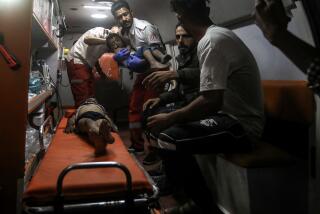Famine in North Korea Called Grim
- Share via
TOKYO — North Korea is descending into the “hell of a severe famine,” with as many as 8 million people at risk of dying from malnutrition and disease, says a U.S. congressman who just returned from the stricken Communist country.
The grim assessment Tuesday by Rep. Tony P. Hall (D-Ohio) came amid mounting relief efforts to prevent a full-scale catastrophe in the North and as the secretive regime made the unprecedented disclosure that 134 children have so far died of malnutrition.
Hall, a hunger expert, said he was “stunned” by the widespread misery he saw during his visit April 4-7. He described emaciated soldiers whose uniforms hung from their bodies; people foraging for grass and clover; and children who looked half their age suffering from stunted growth, distended bellies, dysentery and other ailments related to malnutrition.
At one orphanage, nine 6-month-old babies were obviously very sick, and about half of them probably will not live to see the next harvest, he said.
A food distribution center he visited had no food, and hospitals had virtually no medicine or heat. Hall said he saw virtually no trees outside the capital, Pyongyang--most having been cut down for fuel. Factories were closed and tractors were not moving, and Hall said he saw thousands of people planting trees and digging ditches to remove mud deposited by two years of floods.
Since his first visit last year, he said, daily rations appear to have plunged by as much as two-thirds, with most people now receiving only half a bowl of rice a day.
“Everyone is systematically starving together,” Hall said at a Tokyo news conference. “There’s a lot of things wrong with North Korea, but the fact is they’re in trouble and they need help.”
After months of negotiation, American grain trader Cargill Inc. announced Tuesday that it will barter about 20,000 tons of wheat for about 4,000 tons of zinc in what is thought to be the first direct sale of U.S. wheat to North Korea since the Korean War ended in 1953. The United States still maintains a trade embargo against North Korea, but Cargill received a one-time exemption.
In Seoul, religious and civic groups said they will raise about $19 million to buy 110,000 tons of corn for their starving northern kin after the South Korean government loosened restrictions on such private aid. The South Korean Red Cross also sent more than $1 million worth of food and vegetable seed to the North.
And the U.N. World Food Program last week doubled its latest appeal for food aid to 203,000 tons--a fraction of the 2.3 million tons the relief organization said the nation needs.
But Hall urged even greater international efforts.
The U.S. congressman said he was allowed freedom to travel to remote northern areas and make unannounced stops during his second visit to North Korea, where the flooding and decades of poor agricultural planning have spawned the dire food shortage. Despite the crisis, Hall said, not one person he met criticized the North Korean government, and all expressed faith that the regime’s “Dear Leader,” Kim Jong Il, would help them.
Asked about reports that North Korea is diverting a huge portion of its scarce capital for military purposes--the regime reportedly spends $6 billion annually on its defense budget, including a missile development program--Hall said urgent humanitarian needs outweigh political considerations. He also said food aid should not be used as a political tool to lure North Korea to proposed peace talks with South Korea, the United States and China.
He said the United States poured food aid into Angola--a “hideous” government--and into Ethiopia and that it should do the same for North Korea.
So far, the United States has offered $10 million and South Korea $6 million in response to the World Food Program’s appeals for relief. Hall said he plans to urge Japan, which maintains sizable stockpiles of surplus rice, to join the relief efforts.
Japan is refusing to respond to the WFP’s latest appeals for food until North Korea provides information about the alleged kidnapping of a schoolgirl about 20 years ago.
More to Read
Sign up for Essential California
The most important California stories and recommendations in your inbox every morning.
You may occasionally receive promotional content from the Los Angeles Times.














